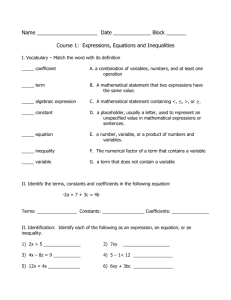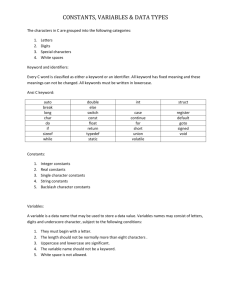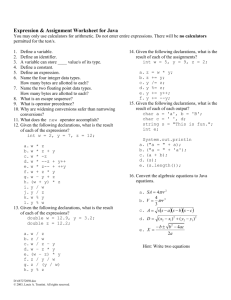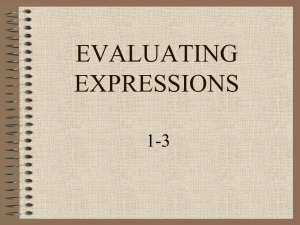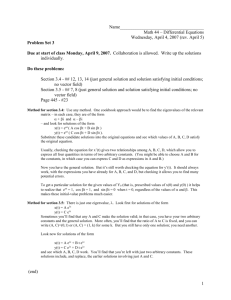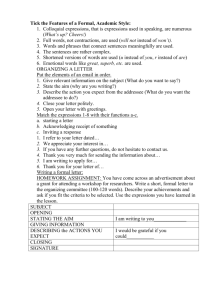Jan. 14
advertisement
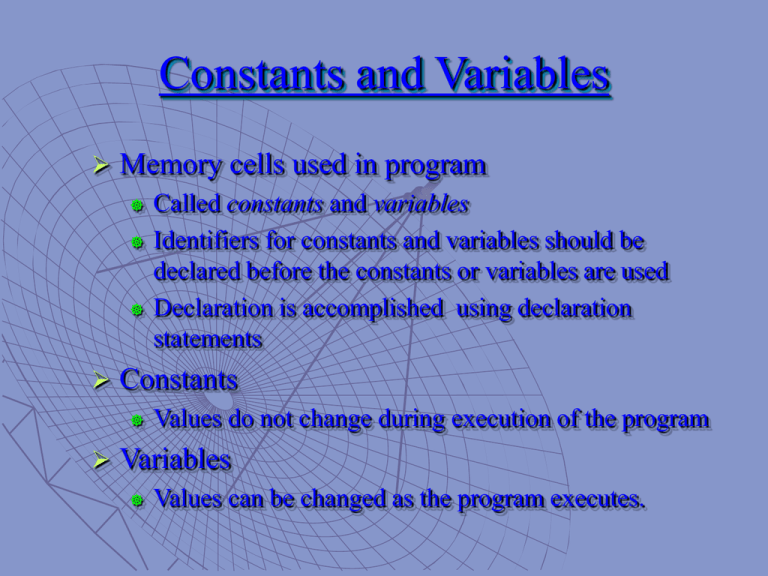
Constants and Variables Memory cells used in program Called constants and variables Identifiers for constants and variables should be declared before the constants or variables are used Declaration is accomplished using declaration statements Constants Values do not change during execution of the program Variables Values can be changed as the program executes. Declarations of symbolic constants in Java Value of a constant can not change during the execution of the program Constant must be initialized when it is declared Syntax of constant declaration final TYPE identifier = value; OR static final TYPE identifier = value; Examples final float PI=3.141592654F; static final double CONVERT=2.21; Declarations of variables in Java A variable declaration assigns names for variables (memory cells used in program) Syntax of variable declaration TYPE var_identifier; or TYPE var_identifier1=value, var_identifier2, …; multiple variables of the same type may be declared on the same line Variable may be initialized when it is declared Examples of Declaration of Variable Objects int my_integer_value; char middle_initial, first_initial; byte counter; double ScaleFactor; float temperature; Boolean TestResult Initialization Memory locations associated with defined constants must be initialized when the constants are defined Memory locations associated with variables may be initialized anywhere in the program Initialization may occur in the declaration statement Initialization may be done after declaration using an assignment statement Memory locations associated with variables should have their values defined before they are used. It is good programming practice to initialize variables at the start of your program Examples: Initialization and Declaration long my_integer_value = -12L; char myinitial = ′a′; byte counter = 31; short AgeInYears = 22; double ScaleFactor = 17.346798574; float temperature = 3.475F; boolean done_flag=false; Data Types and Expressions Data Type A set of values plus a set of operations on those values A crucial concept on modern programming Data Type of a variable determines how its memory cells are interpreted In Java every variable or constant object has a type Only values of that type can be directly assigned to the variable. Operators combine variables of the same type Methods for implicit and explicit conversions between types exist for specific conversions Expressions An expression can be a single variable, or can include a series of variables. If an expression includes multiple variables they are combined using operators Arithmetic expressions manipulate numeric variables following the rules of algebra and have numeric values. Integral expressions manipulate integer values Floating point or decimal expressions manipulate floating point numbers Relational expressions compare numerical values and have logical (boolean) values Logical expressions combine boolean variables or expressions and yield boolean values Expressions An expression is a series of variables combined using unary and/or binary operations An algebraic expression has a numeric value, a relational or logical expression has a boolean value Example X*Y is an algebraic expression If the variables X and Y have different types then they must be converted to a common type before the expression X*Y is evaluated The type of the value of the entire expression is the same as the common type the variables are converted to Assignment Statements Basic statement using the assignment operator to set the value of a variable to the value of an evaluated expression A way to save the results of evaluating an expression Form: resultvariable = expression; Examples: X = X + X * Y; root = -3; X += Y; X -= 5; The types of the resultvariable and expression must be the same. Assignment operators A=B assign value of expression B to variable A, store result in A A += B add the value of expression B to variable A, store result in A A -= B subtract the value of expression B from variable A, store result in A A *= B multiply the value of expression B by variable A, store result in A A /= B multiply the value of expression B by variable A, store result in A Rules for implicit conversion The value of the expression in an assignment statement may be converted to the type of the resultvariable The value of one of the operands of a binary operation may be converted before the operation is performed Some conversions are done implicitly. These conversions are the widening conversions that always have valid results byte to int float to double short to int int to long int to float Explicit conversion: The cast operation In Java you can explicitly convert the type of a variable or expression within a larger expression using a cast operator The value of the variable or expression is not changed The value used in the larger expression is converted to the requested type Sample expressions including casts (int)(Floatone+Floattwo) (float)Integerone + Float1 + Float2 (double)(int1)+double(short2) * double2 (float)(int1)/int2
